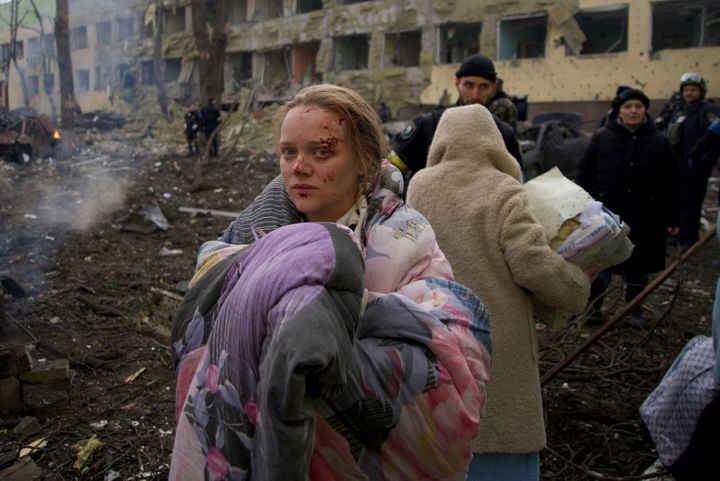President Joe Biden labeled Russia’s Vladimir Putin a “war criminal” last month amid the Kremlin’s ongoing invasion of Ukraine, an onslaught that has forced millions from their homes and killed more than 1,100 civilians.
The chief prosecutor of the International Criminal Court, or ICC, said shortly after the war began he would open an investigation into any possible war crimes, and the human rights chief at the United Nations said there is credible evidence that the Kremlin’s military action may amount to such.
Advertisement
But what’s the international justification for labeling someone a war criminal, and how are they punished?
HuffPost spoke with Leila Sadat, the James Carr professor of international criminal law at Washington University in St. Louis, who has served as a special adviser on crimes against humanity to the ICC since 2012.
What is a war crime?
The ICC was established by an international treaty called the Rome Statute and became the first permanent international criminal court when it began sitting in 2002, with 123 member countries. War is a brutal act, but Sadat said the international community has developed a set of rules about how a war should take place to minimize harm to civilians.
Advertisement
The body can prosecute individuals — heads of state, military members and others — under three broad umbrellas of criminal acts: crimes against humanity, war crimes and genocide. War crimes range from the willful killing of civilians to torture to wanton destruction of nonmilitary targets, but the key is the intent to cause harm outside of those guidelines, known as the law of armed conflict.

AP Photo/Mstyslav Chernov, File
“The adoption of unlawful methods, or the targeting of unlawful targets is criminal if it’s done with intent,” Sadat said, adding that under those rules, sites like hospitals, schools and places of cultural importance should be safe from attack. “An accident could happen — you could accidentally shoot somebody that you shouldn’t shoot — and it might be a violation, but it might not be criminal.”
Russia has been accused of targeting such sites, bombing a theater in Mariupol sheltering civilians labeled “children” and striking a maternity hospital in the city that left at least three people dead. Ten people were also killed waiting for bread in Chernihiv.
Who decides if a war crime has been committed?
Advertisement
The ICC’s chief prosecutor, Karim Khan, formally opened an investigation into Russia’s behavior shortly after the invasion began, but the groundwork had been in place since Russia’s annexation of Crimea in 2014. Forty-one member states jointly asked Khan to open a probe into possible war crimes and an advance team was sent to Ukraine as the attack began.
The evidence will then presented to the court, comprising 18 judges from around the world, no two from the same country.
Politically the answer is a bit different: Diplomats can lob the term “war criminal” as a catchall for horrifically bad behavior.

Michel Porro via Getty Images
What evidence do ICC investigators look for?
The ICC team on the ground in Ukraine and neighboring states will look at everything: aerial photographs, interviews with refugees, footage from public databases like eyeWitness to Atrocities, which lets those impacted by war upload footage from conflict zones.
NATO members, including the United States, also provide valuable intelligence that could range from transcripts of phone calls between generals to drone footage that can prove the laws of war have been violated.
Sadat said when it appears like a bad actor has been committing “a lot of illegality, then you start to think it’s intentional.”
“The level of aerial bombardment is just so shocking. The devastation of these cities,” she said of the ongoing attack in Ukraine.
Investigators will also look impartially at both sides in a conflict, so Ukraine could also be accused and investigated for war crimes.
How is a war criminal punished?
Advertisement
There is no death penalty, but those convicted of war crimes or crimes against humanity can be punished with heavy sentences that stretch into the decades, including life imprisonment.
Getting someone to stand trial is another matter, and cases against accused war criminals are a long game, Sadat said. Prosecutors can decide to issue an arrest warrant to have someone stand trail in The Hague, but they have no authority to wade into Russia and slap the accused in handcuffs.

MIKHAIL KLIMENTYEV via Getty Images
“It makes someone’s life really miserable,” Sadat said. “Unfortunately it’s not quick, it’s not like a bad crime has been committed in St. Louis, they chase them for a couple days, boom you have them in jail.”
Still, international pressure and frustration among people dealing with sanctions and the heavy toll of war can result in political shifts that could lead to the removal of those in power. That happened in the former Yugoslavia when Slobodan Milošević was put on trial for his role in the the Bosnian and Kosovo wars before the ICC was established. He stood trial but died in his cell in The Hague before a verdict was reached.
The ICC also issued an arrest warrant in 2008 against Sudan’s former president Omar al-Bashir on accusations of war crimes and genocide in Darfur. He remained in power until 2019, however, until he was ousted in a coup. Sudan only said it would hand him over last year, more than a decade later.
Is it important that Biden is calling Putin a war criminal now?
“Politicians are looking for a response here — and a vigorous response — because it’s an awful conflict,” Sadat said. “They hope to score domestic political points, but branding an individual a war criminal, that’s a big deal, especially another head of state.”
Such a designation can impede diplomatic efforts, especially in the midst of a war, she added. But Ukrainian President Volodymyr Zelenskyy has said he remains open to negotiations.
Still, Sadat said the Kremlin’s pattern of bombing cities appeared indiscriminate and shocking, saying labeling such acts as crimes seems like the right thing.
“They’re using techniques that are completely illegal to achieve a state purpose, and they’re incorrigible. You can’t sit down and negotiate with them,” she said. “When you think of criminality, the criminal law is the harshest law we have. When you get there, it’s because everything else has failed.”
Advertisement

Tasos Katopodis via Getty Images




